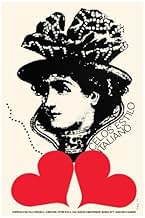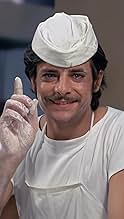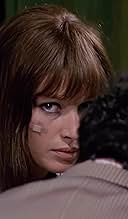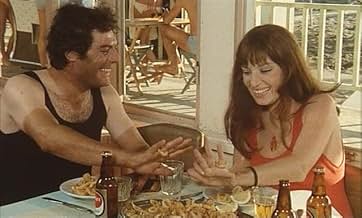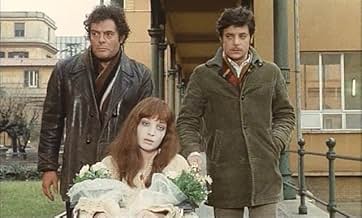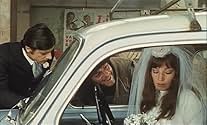VALUTAZIONE IMDb
7,1/10
2610
LA TUA VALUTAZIONE
Una storia d'amore a tre nella Roma dei primi anni Settanta.Una storia d'amore a tre nella Roma dei primi anni Settanta.Una storia d'amore a tre nella Roma dei primi anni Settanta.
- Regia
- Sceneggiatura
- Star
- Premi
- 3 vittorie e 5 candidature totali
Manuel Zarzo
- Ugo
- (as Manolo Zarzo)
Hércules Cortés
- Ambleto di Meo
- (as Hercules Cortes)
Fernando Sánchez Polack
- District Head of Communist Party
- (as Fernando Sanchez Polak)
Angelo Casadei
- Street Spectator
- (non citato nei titoli originali)
Nestore Cavaricci
- Waiting man in hospital
- (non citato nei titoli originali)
Recensioni in evidenza
The fact that Paul Frees seems to do all the men's voices except for Marcello Mastroianni's and Giancarlo Giannini's seems to add a certain sameness to all the other men in the dubbed version of this film. Mastroianni is a communist bricklayer in love with Monica Vitti and she with him. He's best friends with Giannini, a Communist pizza maker, who's in love with Monica Vitti and she with him. It's like a dirty joke about them commies, they share everything. Except being human, they can't. It drives everyone crazy and the movie is very funny.
There seems to be enormous amounts of real subtextual commentary lost in translation. Mastroianni has his middle left finger in a sling throughout the movie, and is occasionally found on trash heaps. Given that his character's name is "Oreste" I think there's a reference to the classical legend, but it's not the Homeric, Pindaric, Sophoclean versions, but the bogus Robert Graves Year-King, fighting over Monica Vitti. Mastroianni does have flies buzzing around him a lot, indicating he's the Old King.
Given three screenwriters, including Age and Scarpelli, and Ettore Scola directing (he had given Vitti her first screen role almost two decades earlier), there is obviously a lot in this movie that is both precisely of its time and of its place, ill suited to the sort of random translation that an Italian sex comedy got in the 1970s. Unless someone is willing to go back and do a more careful translation, there's little more than a funny and bizarre comedy here. However it certainly is that.
There seems to be enormous amounts of real subtextual commentary lost in translation. Mastroianni has his middle left finger in a sling throughout the movie, and is occasionally found on trash heaps. Given that his character's name is "Oreste" I think there's a reference to the classical legend, but it's not the Homeric, Pindaric, Sophoclean versions, but the bogus Robert Graves Year-King, fighting over Monica Vitti. Mastroianni does have flies buzzing around him a lot, indicating he's the Old King.
Given three screenwriters, including Age and Scarpelli, and Ettore Scola directing (he had given Vitti her first screen role almost two decades earlier), there is obviously a lot in this movie that is both precisely of its time and of its place, ill suited to the sort of random translation that an Italian sex comedy got in the 1970s. Unless someone is willing to go back and do a more careful translation, there's little more than a funny and bizarre comedy here. However it certainly is that.
This is the passionate, tragic, acid, perversely funny story of a love triangle -- at one point, almost a ménage-à-trois -- involving bricklayer Oreste (Mastroianni in one of his very best performances, a sort of grotesque version of his character in "I Compagni"), flower-seller Adelaide (isn't it time we acknowledged Monica Vitti as THE most accomplished Italian comedienne ever? And being that gorgeous didn't hurt either) and pizzaiolo Nello (Giancarlo Giannini in a star-making role). With this film, Ettore Scola proved to be the great new voice in commedia all'italiana, a deserving heir to the maestri of this great tradition (DeSica, early Fellini, Germi, Monicelli, Risi) but adding steamier sarcasm and corrosiveness in his pitiless criticism of Italian society and its conservative mores.
We, as the audience, play a very important part here: it's to us (the invisible judge of a trial) that Oreste, Adelaide and Nello present their cases in the flashbacks that shows us the different angles of their convoluted story of friendship, love, betrayal and attempted murders/ suicides, in a sort of comedic Rashomon. The expertise of Scola's writing and the charisma of the starring trio make us care a lot for those hopeless losers, so unmistakably human.
Scola achieves a very rare thing: he uses caricature, comedic clichés and grotesqueness and raises them to refined art, craftily mixing tragedy and comedy with political overtones and social satire. This is on the same level as (and is a sort of cross between) Scola's masterpieces "C'Eravamo Tanto Amati" and "Brutti Sporchi Cattivi". You can do no wrong here: this is a delight that keeps your brain working AND your laughing muscles contracting, an achievement that sounds almost paradoxical by today's moronic, puerile standards of film comedy.
We, as the audience, play a very important part here: it's to us (the invisible judge of a trial) that Oreste, Adelaide and Nello present their cases in the flashbacks that shows us the different angles of their convoluted story of friendship, love, betrayal and attempted murders/ suicides, in a sort of comedic Rashomon. The expertise of Scola's writing and the charisma of the starring trio make us care a lot for those hopeless losers, so unmistakably human.
Scola achieves a very rare thing: he uses caricature, comedic clichés and grotesqueness and raises them to refined art, craftily mixing tragedy and comedy with political overtones and social satire. This is on the same level as (and is a sort of cross between) Scola's masterpieces "C'Eravamo Tanto Amati" and "Brutti Sporchi Cattivi". You can do no wrong here: this is a delight that keeps your brain working AND your laughing muscles contracting, an achievement that sounds almost paradoxical by today's moronic, puerile standards of film comedy.
A brilliant film; all three leads are just magnifico and Monica Vitti never looked better. Vitti, Mastroianni and Giannini in one film! Sharp treatment of un amour fou. Had never heard of the film before I recently saw it at a festival of restored films at MoMA in New York--what a terrific surprise, a genuine treat, funny and dark film about obsession. I doubt it could ever have been made in the US unfortunately; can't think of any American directors who could handle this successfully. Mastroianni shows his great range. If you love Italian film, see it soon! Now I'm going to see any other Ettore Scola films I can find or haven't seen yet.
This is one of the best Italian comedies ever made. Known both as A DRAMA OF JEALOUSY and THE PIZZA TRIANGLE, it is an engrossing farce about a love triangle in modern Rome. Bricklayer Marcello Mastroianni meets flower-seller Monica Vitti at a political demonstration. He decides to ditch his fat, older wife for her. All goes well until a pizza, in the shape of a heart, arrives. It is sent to the girl by a young pizza-chef, played by Giancarlo Giannini. The pizza man becomes Vitti's lover, and poor Marcello goes mad with jealousy and attempts suicide, as do each of the other two at some point in this hysterical soap opera. The three lead performers, among the best that the Italian cinema has ever had to offer, are magnificent, as is the direction and comic timing by Ettore Scola, whose DOWN AND DIRTY this would make an appropriate companion-piece to. One could call this movie "commedia all'italiana" with peppers, mushrooms, and cheese.
I loved seeing this at MoMA on 10/20/11. We first meet Monica Vitti & Marcello Mastriani at the closing down of a small ramshackle street fair/carnival in an ugly empty lot in Rome. She is urging the ride operator to give a longer experience & he has drank a bit too much after helping to tear down some of the exhibits & falls asleep awaking to Monica kissing on him. A romance begins amongst piles of plastic garbage & flies while he continues to go home to a wife who appears to be his mother. Flashbacks to recreating a crime for detectives take us back to the florid romantic affair complete with lush orchestrations featuring that electronic harpsichord so popular during this early 70's time period. What follows is a charming absurdly funny at times interesting story told in fascinating narrative involving characters turning to talk to us in the audience in order to inform us of different aspects of character & story that we otherwise wouldn't know - sometimes in theatrical spotlights - other times in extreme close-up. I particularly liked some of the sped up film & over amplified sound effects, esp. physical hits which gives the film that "slapstick" crazy kind of absurd playfulness. Other online reviews can give further insights into this enjoyable piece. I would say that this one is prime pickings for remake since it's distribution has been inconsistent & spotty at best.
Lo sapevi?
- QuizThis was the first of eight starring feature film roles Marcello Mastroianni would appear in for Ettore Scola. These films included Una giornata particolare (1977), La terrazza (1980), Il mondo nuovo (1982), Permette? Rocco Papaleo (1971), Splendor (1989), Che ora è? (1989), and Maccheroni (1985).
- Citazioni
Oreste: How would you like a pizza? Huh?
Adelaide: You mean pizza?
Oreste: Yes! Pizza.
Adelaide: But, I'm not in the mood for pizza.
Oreste: Oh, but your favorite meal is pizza. Come on!
Adelaide: But, I don't feel like eating pizza today.
Oreste: You can't talk me out of it. We're definitely eating pizza.
- ConnessioniEdited into Dolce Vitti (2014)
I più visti
Accedi per valutare e creare un elenco di titoli salvati per ottenere consigli personalizzati
- How long is The Pizza Triangle?Powered by Alexa
Dettagli
- Tempo di esecuzione1 ora 47 minuti
- Mix di suoni
- Proporzioni
- 1.85 : 1
Contribuisci a questa pagina
Suggerisci una modifica o aggiungi i contenuti mancanti

Divario superiore
By what name was Dramma della gelosia (tutti i particolari in cronaca) (1970) officially released in Canada in English?
Rispondi
